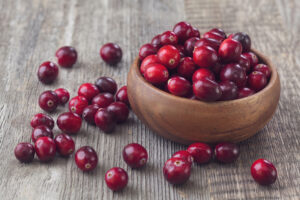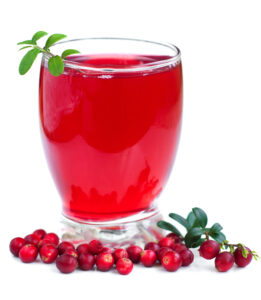Are Cranberry Supplements As Effective As Cranberry Juice?
Author: Dr. Stephen Chaney
 UTIs (urinary tract infections) are not to be taken lightly. Here are some fast facts:
UTIs (urinary tract infections) are not to be taken lightly. Here are some fast facts:
- They occur most frequently in women:
-
- 50%-60% of women will have at least one UTI in their life.
-
- 25% of women will experience recurrent UTIs as often as 3-4 times per year.
2) They occur much less frequently in men, but their frequency increases significantly in men over the age 50, usually due to prostrate enlargement or other factors that interfere with bladder emptying.
3) The symptoms of UTIs are unpleasant. They are:
-
- A burning, painful feeling when urinating.
-
- A need to urinate more often.
-
- Sudden urges to urinate.
-
- Blood in the urine or cloudy urine.
4) The risks of untreated UTIs can be significant. They include:
-
- Infection of the kidney or prostate, which are much more difficult to treat.
-
- Sepsis, which occurs when bacteria from the urinary tract enter the bloodstream. This can be very serious, even deadly.
5) The standard treatment for UTIs is antibiotics. This treatment is usually effective, but there are side effects to antibiotic treatment, especially when it is repeated 3-4 times per year.
6) For men with repeated UTIs caused by an enlarged prostrate, the standard treatment is usually prostrate reduction surgery. Again, this treatment is usually effective, but it can have some life-changing side effects. According to the Mayo Clinic, they include:
-
- Urinary incontinence (difficulty holding urine).
-
- Urgent and frequent need to urinate.
-
- Having to get up more frequently in the night to urinate.
In short:
- The symptoms of UTIs are unpleasant.
- The risk of not treating UTIs is significant.
- Standard UTI treatments work but can have significant side effects.
A Brief History Of Cranberry Products And UTIs
 So, you are probably asking, “What if there were a natural treatment with no side effects?” And you have probably heard that cranberries can effectively treat UTIs. Is that true, or is it an “old wives’ tale”?
So, you are probably asking, “What if there were a natural treatment with no side effects?” And you have probably heard that cranberries can effectively treat UTIs. Is that true, or is it an “old wives’ tale”?
There are good reasons for thinking that cranberries and cranberry products (cranberry juice and cranberry supplements) might prevent UTIs.
- Cranberries contain polyphenolic compounds called proanthocyanidins (PACs for short) that prevent bacteria from sticking to the cells that line the bladder.
- Several clinical studies have reported that cranberry products are useful for treating UTIs.
However, other studies have come up empty. The Cochrane Collaboration (considered the gold standard for reviewing the usefulness of pharmaceutical and nutraceutical interventions, reviewed the literature on cranberry products and UTIs in 2012 and said there was not enough moderate to high quality evidence to conclude that cranberry products were effective in preventing UTIs.
If you scan the internet nowadays, that is the overwhelming message you will find. Most medical centers and reliable sources of health information will tell you that the effectiveness of cranberry products for treating UTIs is a myth. It is an “old wives’ tale”.
But time marches on. More clinical studies on the topic have been published and the Cochrane Collaboration has once again reviewed the data. The latest review (G Williams et al, Cochrane Database of Systematic Reviews, Issue 4. Art. No.: CD001321, 2023) came to a very different conclusion.
I will share their findings below. But first I will discuss why it has been so difficult to decide whether cranberry products are effective at preventing UTIs.
Why Are Studies On Cranberry Products And UTIs So Confusing?
 Let me start by telling you what Cochrane Collaboration studies are and why they are so respected.
Let me start by telling you what Cochrane Collaboration studies are and why they are so respected.
In simplest terms, a Cochrane Collaboration study is what is called a meta-analysis. A meta-analysis combines data from many smaller studies. This allows them to make statistically significant comparisons that would not have been possible with a smaller data set.
However, what most non-scientists do not know is that statistically significant comparisons can be false if the meta-analysis includes studies that are poorly designed. I refer to this as “Garbage in; garbage out.”
The strength of Cochrane Collaboration studies is that they not only report statistically significant conclusions. They also report the quality of data on which that conclusion was based – rating it as either poor, moderate, or high quality. And statistically significant conclusions based on poor quality data are generally ignored.
With that behind us, let’s ask what causes the “Garbage in; garbage out” phenomenon. There are multiple causes, by I will only mention two that are relevant to this discussion.
- The total number of participants in the studies included in the meta-analysis. When you combine multiple studies there will be differences in the population groups included in different studies. To obtain high quality data, you need to have a large enough population group in the meta-analysis so that these differences are minimized.
-
- This is an acute problem for studies on the efficacy of cranberry products for UTIs. Cranberry products cannot be patented, so studies on their efficacy are not backed by pharmaceutical companies with deep pockets. Consequently, these studies are very small.
-
- This is the biggest difference between the 2012 and 2023 Cochrane Collaboration studies. The 2023 study was able to include 26 additional studies with around 4,000 participants that were published after 2012. This moved some of the effects seen in the 2012 study from low-quality to moderate-quality status.
-
- Thus, while the 2012 study concluded that existing data did not support the use of cranberry products, the 2023 study was able to conclude that cranberry products were effective in some population groups.
2) Differences in study design. There are a lot of differences I could discuss, but I will focus on differences in the cranberry products used in these studies in my discussion below.
Does Cranberry Juice Cure UTIs?
 When the 2023 Cochrane Collaboration study looked at randomized studies that compared cranberry products to a placebo or to no intervention, they found that with moderate quality evidence:
When the 2023 Cochrane Collaboration study looked at randomized studies that compared cranberry products to a placebo or to no intervention, they found that with moderate quality evidence:
- Cranberry products reduced the overall risk of UTIs by 30%.
When they looked at individual population groups, cranberry products:
- Reduced the risk of UTIs in women with recurrent UTIs (8 studies, 1555 participants) by 26%.
- Reduced the risk of UTIs in children (5 studies, 504 participants) by 54%.
- Reduced the risk of UTIs in people at risk of UTIs because of medical interventions (6 studies, 1434 participants) by 53%.
It should be noted that these are all groups at high risk of developing UTIs. They did not find a beneficial effect of cranberry products in elderly institutionalized men and women, perhaps because the frequency of UTIs was lower in that group.
The authors felt it worth mentioning two analyses that were considered low quality evidence because of small sample size.
- They did not see a difference in effectiveness between cranberry products and antibiotics. This would be a huge finding if it is supported by studies with larger population groups.
- Cranberry products were 61% more effective at reducing the risk of UTIs than probiotics. This was not unexpected, but this conclusion was based on only 3 studies with 215 participants, so the quality of evidence was low.
The authors concluded, “These data support the use of cranberry products to reduce the risk of symptomatic, culture-verified UTIs in women with recurrent UTIs, in children, and in people susceptible to UTIs following medical interventions. The evidence currently available does not support its use in the elderly, patients with bladder emptying problems, or pregnant women.”
I would note this is the first Cochrane Collaboration study to support the use of cranberry products for treatment of UTIs in any population group. As it becomes widely known, it is likely to change the recommended treatment of UTIs. I would anticipate physicians recommending cranberry products as a first line treatment for UTIs, with antibiotics becoming a second line treatment.
I also would not be surprised if the efficacy of cranberry products for UTIs is proven for other population groups in future, larger studies.
Are Cranberry Products As Effective As Cranberry Juice?
 The 2023 Cochrane Collaboration meta-analysis included studies with a wide variety of cranberry products, so it was unable to determine whether there was a difference in efficacy between cranberry juice and cranberry tablets.
The 2023 Cochrane Collaboration meta-analysis included studies with a wide variety of cranberry products, so it was unable to determine whether there was a difference in efficacy between cranberry juice and cranberry tablets.
However, other studies suggest that there might be significant differences. The Proanthocyanidins (PACs) found in cranberries can be divided into:
- Water soluble PACs found in the juice and cranberry tablets derived from the juice.
- Water-insoluble PACs found in the pulp and cranberry tablets derived from the pulp.
A recent study (AB Howell et al, Journal of Dietary Supplements,19: 621-639, 2022) found that the water-soluble PACs were much more effective at preventing bacteria from binding to the cells lining the bladder than the water-insoluble PACs. The author of the study concluded that:
- Cranberry juice and cranberry products made from the juice are likely to be much more effective at combating UTIs than cranberry products derived from the pulp.
Cranberry pulp is a byproduct of making cranberry juice. It is much less expensive to make cranberry products from the pulp than from the juice. So, I don’t need to tell you how most commercially available cranberry products are made.
What Does The Professor Do?
 The professor is a tad over 50 and has an enlarged prostate, so I have occasional UTIs. Both my father and my father-in-law experienced urinary incontinence after prostrate reduction surgery, so I don’t want to go that route.
The professor is a tad over 50 and has an enlarged prostate, so I have occasional UTIs. Both my father and my father-in-law experienced urinary incontinence after prostrate reduction surgery, so I don’t want to go that route.
And I prefer natural solutions to antibiotics, so I choose to go the cranberry route when I notice that burning sensation that tells me a UTI is coming on.
If I wanted to take a cranberry pill, I would choose one made from the juice rather than the pulp. However, why take a pill when you can take the real thing, cranberry juice?
But you need to read labels carefully. Many commercial cranberry juices you find in supermarkets contain mostly cheaper juices with just a smidgen of cranberry juice. And most of them contain lots of added sugar, which feeds the bacteria.
So, I reach for unsweetened 100% cranberry juice or 100% cranberry concentrate in the health food store. It’s a bit tart, but it works every time.
The Bottom Line
The use of cranberry products to treat urinary tract infections (UTIs) has been controversial, and many medical professionals have concluded it is not an effective treatment.
However, the latest Cochrane Collaboration study (the gold standard of clinical studies) has concluded that cranberry products are effective in treating UTIs for some populations. This is likely to change medical recommendations for treating UTIs in the future.
For more information on this study, which cranberry products are best, and what the professor does when he has a UTI, read the article above.
These statements have not been evaluated by the Food and Drug Administration. This information is not intended to diagnose, treat, cure, or prevent any disease.
___________________________________________________________________________
My posts and “Health Tips From the Professor” articles carefully avoid claims about any brand of supplement or manufacturer of supplements. However, I am often asked by representatives of supplement companies if they can share them with their customers.
My answer is, “Yes, as long as you share only the article without any additions or alterations. In particular, you should avoid adding any mention of your company or your company’s products. If you were to do that, you could be making what the FTC and FDA consider a “misleading health claim” that could result in legal action against you and the company you represent.
For more detail about FTC regulations for health claims, see this link.
https://www.ftc.gov/business-guidance/resources/health-products-compliance-guidance
___________________________________________________________________
